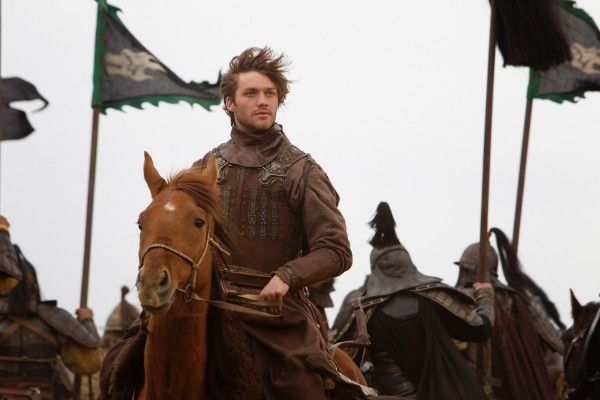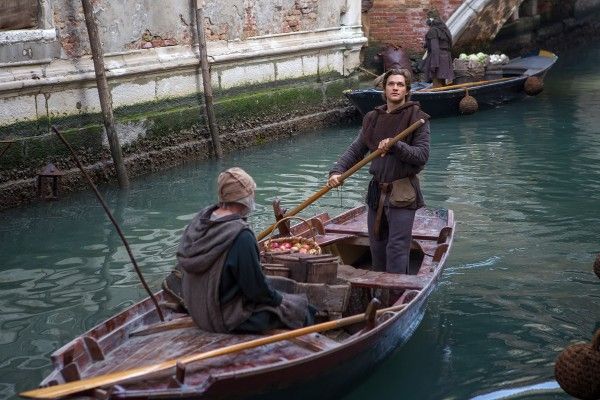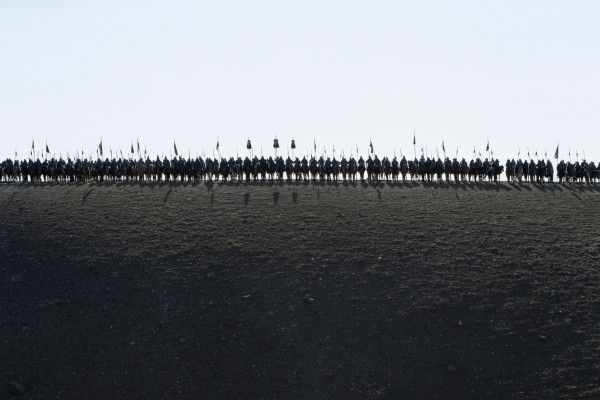Based on the famed explorer’s adventures in Kublai Khan’s ornate court in 13th century China, the 10-episode Netflix original series Marco Polo is set in a world filled with greed, betrayal, sexual intrigue and rivalry. Marco Polo (Lorenzo Richelmy) is a young Italian merchant who arrives in China with a father he barely knows, who then offers him to the Mongol emperor Kublai Khan (Benedict Wong) as a servant. Captivated by the traveler’s way with words, Kublai Khan and Marco Polo develop a deep trust and bond that leads to many tales of adventure and legend.
During this exclusive phone interview with Collider, show creator/writer/executive producer John Fusco talked about why he was compelled to tell the story of Marco Polo, why Netflix was ultimately the perfect home for the show, the approach they decided to take with the material, having an unknown Italian actor in the lead role of such an epic series, and that there’s a treasure trove of material for possible future seasons. He also talked about writing the sequel for Crouching Tiger, Hidden Dragon, which will be available exclusively through Netflix and at IMAX theaters on August 28, 2015, basing it on the sequel to the source material, introducing a new generation of sword heroes and star-crossed lovers, the return of Michelle Yeoh, and bringing in Woo-ping Yuen as director. Check out what he had to say after the jump.
Collider: What was it about this story that not only compelled you to tell it, but also made you feel like you could tell it?
JOHN FUSCO: What it was, really, was that I had an unlikely fascination with China when I was really young, and I became fascinated by Marco Polo. He was an Italian kid traveling in China, and I’m of Italian decent with a fascination for China. So, I always felt this connection to him and lived vicariously through the travels of Marco Polo. One of the things, in reading the travels, that always amazed me was to realize just how so few people know anything, at all, about Marco Polo. This amazing historical figure has been reduced to a hide-and-seek swimming pool game, or the myth that he brought noodles back to the West. When you read his accounts, it’s just so much more enthralling and dramatic and relevant. No one knows about this stuff. It’s one of the great untapped stories, certainly untapped in the long-form TV format, which is the only way I think you can tell the Marco Polo story.
And the reason why I felt that I could do it was because there are few things that I’m as passionate about, as I am about Marco Polo and his story. I have spent time in Mongolia, in China. I have read multiple translations of his book and cross-referenced those with Rashīd al-Dīn, who was the Persian historian of the time. I’ve also cross-referenced with Chinese dynasty accounts. I basically have done my homework and feel like I know the subject. There’s also this East meets West quality about it that’s in my wheelhouse.
This series was originally set up at Starz, and now it’s at Netflix. Were you ever worried that the whole thing might fall apart and never get made, or were you always confident that it would somehow work itself out?
FUSCO: No, I was concerned because I love the show so much. We were going great guns and full steam ahead. When we hit that bump that had to do with a production plan in China, it momentarily stalled, and then it looked like it stalled in earnest, and I felt sick. When you believe in something so strongly, it was just like, “Oh, my god, we’ve gotten it to this point. I’ve had this amazing writers’ room. We’ve got these scripts that everyone just loves.” So, yeah, there was that moment that my heart sunk. But Harvey Weinstein, who’s been the driving force behind this, wasn’t going to let it die. In fact, he knew how to take it to the home that it actually belonged in. The incredible global home of Netflix just makes so much sense for this project, on so many levels. It’s amazing!
When you’re dealing with such a vast, epic tale, how do you decide what to include, where to put the focus, where you stay as close to history as possible, and where you deviate to make compelling TV?
FUSCO: We took an approach to the material that was based on the perception of Marco’s accounts. Most historians today acknowledge his accounts as mostly accurate, but definitely a blend of fact and legend, so we had that latitude. In some regards, the journey is still out on Marco Polo and his accounts. Because Marco has left us gaps in his storytelling, we felt that we could take license and use the historical signposts that Marco writes about, but also get creative. The lightbulb for that idea went off, for me, when I learned about Marco’s deathbed experience, which was recorded in Venetian history. And that was that, on his deathbed, on January 9, 1323, he was surrounded by his friends, his family, his relatives and his priest. They said, “Marco, you’re leaving this world now. This is your chance to recount your fabulous tales. If not all of them, at least come clean on the parts you made up. Take back what you made up.” And Marco is reputed to have gotten very angry, and sat himself up and said, “I haven’t told half of what I saw.” So, I put that story up on the writers’ room wall, on day one, and I said, “We are going to not only dramatize the accounts that Marco wrote about, but we’re going to explore the half he might have seen, all in the spirit on his voice and in the spirit of this rich world that he inspired.”
You have an unknown Italian actor in the lead of this big show. Was there ever any pressure to hire a known actor, or was it always just Lorenzo Richelmy?
FUSCO: Another thing that’s great about Netflix is, who else is going to allow you to go and cast an unknown Italian actor that brings such raw verisimilitude to the role. It’s such authentic casting. I always wanted it to be an Italian actor. We brought in Mongolian actors from Mongolia, and we were really striving for authenticity. But we searched around the globe and looked at well over a hundred Marco Polos, came down to the wire, and went back and looked at our Italy tapes, and we realized that we had overlooked someone. That was Lorenzo Richelmy. So, when it came down and we had some strong candidates, in the end, he won the day. Being Italian was surely a part of it, but it was also this uncanny blend of innocence and confidence. He could play this boyishness, but he’s also a man. He was our guy.
You had the scripts in place and you had your cast, but what was your relationship with the directors?
FUSCO: I worked very closely with the directors. Dan Minahan was great at finding the best directors and the best DPs, to unify the look and style of the show. They were all huge on preparation and research, so I was able to bond with each of them. I was on set with them and I was open to their great ideas. The directors all contributed so much. They kept the voice consistent, but they all brought their own unique signature to it.
When you tell a story like Marco Polo, that is so epic in scope and scale, do you have to have it fully detailed and planned out before it ever starts shooting, and do you also have to allow for some open doors for future seasons?
FUSCO: Everything is carefully planned out. I come out of the features world and I learned, very quickly, that TV is this run-and-gun approach to production. You have to measure three times and cut once. Everything needs to be planned out, very carefully. We had our scripts ready, well before production, so we were able to fine tune them. Of course, you make discoveries along the way and in rehearsals, and that’s all exciting. In terms of a future for the show, my focus is in doing the best Season 1 that we can. Marco Polo was in China for 17 years, so there’s a treasure trove of material. But at this point, I’m just focused on Season 1.
You must have had a positive experience working with the Weinstein Company and Netflix, teaming up with them again to write the Crouching Tiger, Hidden Dragon follow-up. Is that more of a companion film, or is it an actual sequel?
FUSCO: I view it as a sequel because it’s actually based on the literary sequel to book 4 of the Wang Dulu pentalogy, which is the source material for Crouching Tiger. In fact, when Harvey first contacted me, I told him that the only way that I would do this would be if we could be true to that source material and base the sequel on book 5, which was called Iron Knight, Silver Vase. In that literary sequel, a new generation of sword heroes and star-crossed lovers is introduced, and Harvey was all for that. He agreed and felt that was the only way to do it, to be true to the DNA of the project, but also to bring Michelle Yeoh back and to bring in Master Woo-ping, who really created the Crouching Tiger fight vernacular. He’s a man that’s considered a pioneer of the genre that inspired Ang Lee, and he came in to direct. That’s what it is. We’re not out there trying to top anything, in a Hollywood fashion. We’re telling a sequel, based on the literary sequel to the book.
Even though it will be available through Netflix, which makes the viewing easier for people, would you recommend that people make the extra effort and spend the extra money to see the film in IMAX theaters, if possible?
FUSCO: I think that with the movie-going experience evolving the way it is, it’s really up to the viewer. Do you go to a sporting event, like a football game, or do you watch it at home? Some prefer to stay at home and watch it on the couch with their nachos, and they enjoy the game. Others want to go and have the stadium experience. I think it really comes down to the viewer, and that’s what’s great about Netflix. We’re all busy now, at this time in our lives, and viewers want to have the choice of how they’re going to see it.
Marco Polo is available on Netflix, starting on December 12th.




